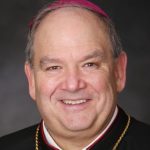As providence would have it, I’m writing these reflections for The Catholic Spirit’s vocations issue from Christ the King Retreat House in Buffalo, where I’m gathered for a weekend retreat with Father Mark Pavlak (the archdiocesan vocations director), a number of our college seminarians and 10 young men considering whether the Lord might be calling them to enter our St. John Vianney College Seminary in St. Paul.
It’s always one of my favorite weekends of the year, but it is particularly welcome this year. Amid the tensions associated with the close of a bitter electoral campaign, it’s been a blessing to be on a Christ-centered retreat with faithful young people who represent such hope not only for our Church but also for our country.

The annual Archbishop’s Discernment Retreat is a venerable tradition in this archdiocese. My predecessors seem to have set the bar high — many of our priests still share the inspirational nuggets that they had heard from Archbishop Harry Flynn when he led this retreat, insights that helped them to embrace their calling. “If I had a hundred lives,” he would say, “I would live them all as a priest.” I’m still hoping that someone will publish a collection of his writings on vocations and priestly ministry, stretching back to his time as rector of Mount St. Mary Seminary in Emmitsburg, Maryland, and capturing the brilliance of the many retreats for priests, seminarians and future seminarians that he led well into his retirement.
Archbishop Flynn followed in a long line of local shepherds with a passion for promoting vocations. It was Archbishop Ireland’s concern for promoting and cultivating vocations that led to the founding of the forward-thinking educational institution that eventually developed into The St. Paul Seminary, the University of St. Thomas and St. Thomas Academy. It was the dream to carry that vision forward that led to the founding by Archbishop Dowling of the Nazareth Hall preparatory seminary in Arden Hills, an institution that helped hundreds of young men discern their call, beginning with those of high school age.
Archbishop Murray was known to have a heart for vocations as well. Our senior archdiocesan priest, Father George Welzbacher, tells the story about how his life changed when he met up with Archbishop Murray on a streetcar one day, as the archbishop convinced young George to attend Nazareth Hall. I’m thinking that I need to take public transportation more often!
It was Archbishop Brady, however, who made a key contribution to the development of a culture of vocations in the archdiocese when he promulgated an archdiocesan prayer asking God to bless this local Church “with many priests, brothers and sisters who will love (God) with their whole strength and glad spend their entire lives to serve (the) Church and to make (God) known and loved.” More than 60 years later, that’s a prayer that many of our parishes use. We pray it every time the sacrament of confirmation is celebrated at the Cathedral. There’s a line in the prayer that chokes me up every time we pray it: “Choose from our homes those needed for thy work.” I’m so grateful that we have families still praying that prayer in 2024 and encouraging their sons and daughters to consider how the Lord might be calling them to his work.
Since the Second Vatican Council and its emphasis on the universal call to holiness, we’ve broadened and enriched the notion of vocation to include callings beyond the priesthood and religious life. The Church emphasizes that all of us, in virtue of our baptisms, receive a sacred call. While it’s still appropriate to speak about priestly vocations and religious vocations, it’s also important to see marriage as a vocation, to recognize the permanent diaconate as a vocation, and to recognize the contribution that single persons can make in the Church as well, even outside of formally consecrated life.
The Holy Spirit continues to deepen our understanding and experience of vocation. We have seen a flourishing in our archdiocese in recent years of women called to consecrated virginity and a number who are called to live their holiness in the world as members of secular institutes. We have also seen the way in which our local Church has been enriched by those who have found a home in the ecclesial movements that are increasingly prevalent in the universal Church, with Pro Ecclesia Sancta, the Emmanuel community, and the Neocatechumenal Way as just a few examples. I know many of our strong Catholics speak as well about their vocation to Opus Dei, or to the People of Praise, or to the Community of Christ the Redeemer.
We are truly blessed by all of these vocations in our archdiocese. Please join me in praying that our young people might always be able to hear the Lord’s call and respond in confidence.




